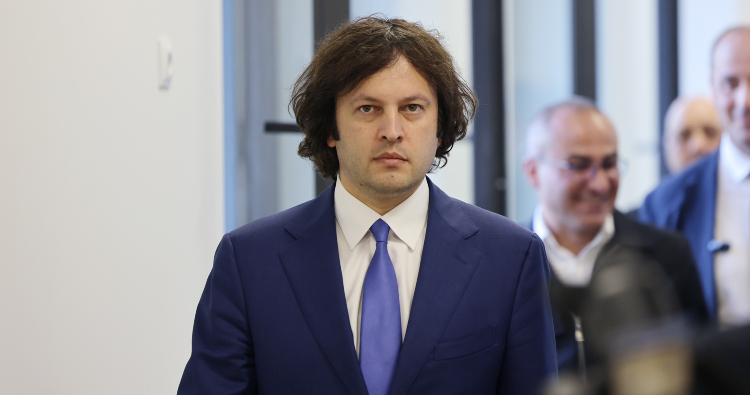Georgian PM accuses “foreign-funded” NGOs of “attempting to interfere with” general election legitimacy

Kobakhidze claimed there were “objectively no arguments against the legal side” of the law and “no noteworthy case” had been heard so far, adding even though he had “personally suggested to our opponents, diplomats, the youth who were taking to the streets [in protest] to sit down and discuss the law”, the protesters had “declined or were made to decline” the offer. Photo: Government Administration
Georgian Prime Minister Irakli Kobakhidze on Tuesday said the country’s “foreign-funded” non-governmental organisations had “attempted to go against the constitutional order twice” in the past and were now making a “third attempt” through “interference with the legitimacy” of the general elections held last month.
In his interview with the PosTV channel, Kobakhidze addressed the alleged challenges by NGOs to the constitutional order in the recent past.
In 2020-2021, they had the intention to change the Government [after the 2020 parliamentary elections] and hold early elections. They were the ones who laid the groundwork for a campaign to declare the elections illegitimate, which, fortunately, they could not accomplish”, he claimedThey set the stage for negotiations and the signing of the [EU-mediated] Michel Agreement [proposing large-scale political and electoral reforms]. The main aim of that agreement was to bring the country to early parliamentary elections, which they failed to achieve, but the attempt remains a fact”, the PM noted.
[Then] we were unfairly denied a [European Union] candidate status without any justification. They [NGOs] directly entered the political stage, demanded the resignation of the Government, which can in no way be considered the work of an NGO, and called for the formation of a new Government with their participation”, the PM continued.
This is the context. If someone can argue that this is a healthy phenomenon, when foreign funds are openly used to try to change the Government and form a new one with their participation, then fine, Kobakhidze added.
The Prime Minister also discussed the law on transparency of foreign influence, adopted in May and requiring registration of non-commercial legal entities and media outlets in the country as “pursuing the interests of a foreign power” if they derive more than 20 percent of their funding from abroad.
He said it had “imposed the only requirement to a minimal standard”.
NGOs must submit an annual declaration to the Ministry of Justice. If they fail to submit it or grossly violate the legislation, only minimal sanctions, such as fines, are provided for. There are no excessive control mechanisms, no opportunity for interference, no restrictions that could apply to a non-governmental organisation allowed for in this law”, the head of the Government pointed out.
Kobakhidze claimed there were “objectively no arguments against the legal side” of the law and “no noteworthy case” had been heard so far, adding even though he had “personally suggested to our opponents, diplomats, the youth who were taking to the streets [in protest] to sit down and discuss the law”, the protesters had “declined or were made to decline” the offer.
 Tweet
Tweet  Share
Share